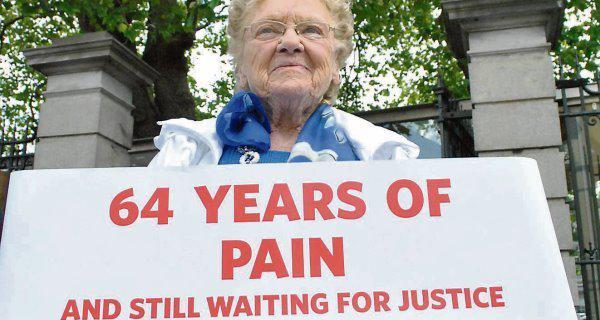|
IRELAND’S HUMAN RIGHTS RECORD: State looked the other way as citizens suffered
By Conall ó Fátharta
Last summer, the chair of the UN Human Rights Committee described Ireland’s human rights record, particularly in relation to women and children, as ‘quite a collection’. In a withering assessment, Nigel Rodley, a leading expert in international human rights law, and a former UN Special Rapporteur on Torture, said Ireland’s collection of human rights failures have gone on for a period that was hard ‘to imagine any state party tolerating’. From Magdalene laundries and the mother-and-baby homes to child abuse and symphysiotomy, recent years have seen the UN repeatedly criticise Ireland’s human rights record on a range of fronts. Compiled by the Irish Council for Civil Liberties, here is a sample of those failures and what the State is doing to address them. Treatie: Various, including the International Covenant on Civil and Political Rights; the International Covenant on Economic, Social, and Cultural Rights; and the UN Convention on the Elimination of All Forms of Discrimination Against Women. Recommendation: The European Court of Human Rights in 2010 ruled, in the case of A, B, and C vs Ireland, that the State had failed to provide an accessible and effective procedure whereby a person could establish whether she qualified for a lawful abortion in Ireland. In 2011, when Ireland was reviewed under the UN Human Rights Council’s Universal Periodic Review (UPR) mechanism, numerous UN member states made recommendations to Ireland to give greater protection to women’s reproductive rights, including access to abortion. Ireland will be reviewed under the UPR again in 2016. In July 2014, the UN Human Rights Committee, which monitors implementation of the International Covenant on Civil and Political Rights, reiterated its concerns regarding the highly restrictive circumstances under which women in Ireland can lawfully have an abortion. In particular, the committee raised concern about the criminalisation of abortion in section 22 of the Protection of Life During Pregnancy Act, including in cases of rape, incest, fatal foetal abnormality, and serious risks to the health of the mother, which may lead to 14 years’ imprisonment, except in cases that constitute a “real and substantive risk” to the life of the pregnant women. The committee also raised concern about: n The lack of clarity around what constitutes “real and substantive” risk to life as opposed to health of the pregnant woman; n The discriminatory impact of the Act on women who are unable to travel abroad to seek abortions; n Strict restrictions on the channels via which information on crisis pregnancy options may be provided and the imposition of criminal sanctions on healthcare providers who refer women to abortion services outside of the State party under the Regulation of Information (Services outside the State for the Termination of Pregnancies) Act 1995; n The severe mental suffering caused by the denial of abortion services to women seeking abortions due to rape, incest, fatal foetal abnormality, or serious risks to health. The committee recommended the State revise its legislation on abortion, including the Constitution, to provide for abortion in cases of rape, incest, serious risk to the health of the mother, or fatal foetal abnormality. It also recommended that the State swiftly adopt the guidance document to clarify what constitutes a “real and substantive risk” to the life of the pregnant woman; and to consider making more information on crisis pregnancy options available through a range of channels. It also wants to ensure healthcare providers who provide information on safe abortion services abroad are not subject to criminal sanctions. In June, the UN Committee on Economic, Social, and Cultural Rights will review how Ireland is implementing its obligations under the International Covenant on Economic, Social, and Cultural Rights. The right to the highest attainable standard of physical and mental health (including reproductive health) and protection from discrimination are provided for in this. It is likely the committee will raise the issue of abortion in June. The UN Committee on the Elimination of all Forms of Discrimination Against Women also expressed concerns over the restrictive abortion laws when it reviewed Ireland’s implementation of its obligations under the UN Convention on the Elimination of All Forms of Discrimination Against Women in 2005. Ireland was due to report to the committee again in 2007 but this report is still outstanding. Current status: The Government has legislated for the X case by enacting the Protection of Life During Pregnancy Act, which provides for lawful abortions to be carried out in cases where there is a “real and substantive risk” to the life of the pregnant woman. An Implementation of the Protection of Life During Pregnancy Act 2013: Guidance Document for Health Professionals was published in 2014. Abortion in cases of rape, incest, fatal foetal abnormality, or serious risk to health remains unlawful.
|
.
Any original material on these pages is copyright © BishopAccountability.org 2004. Reproduce freely with attribution.
